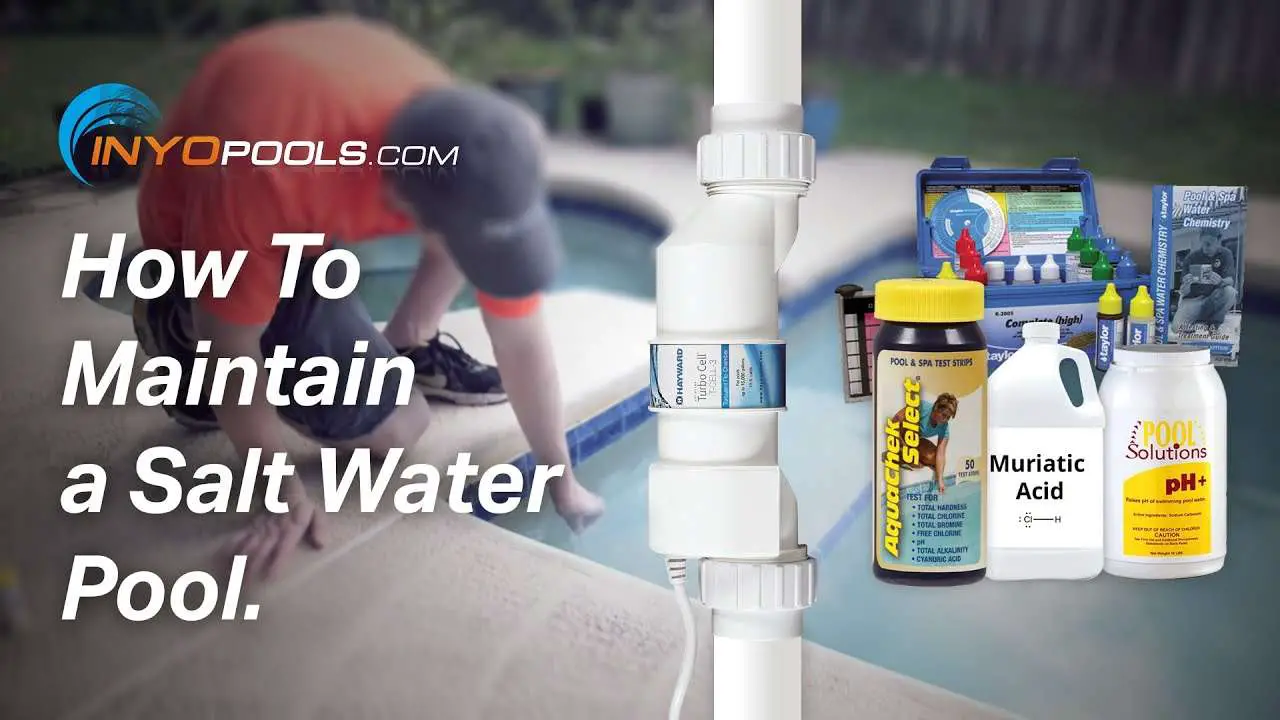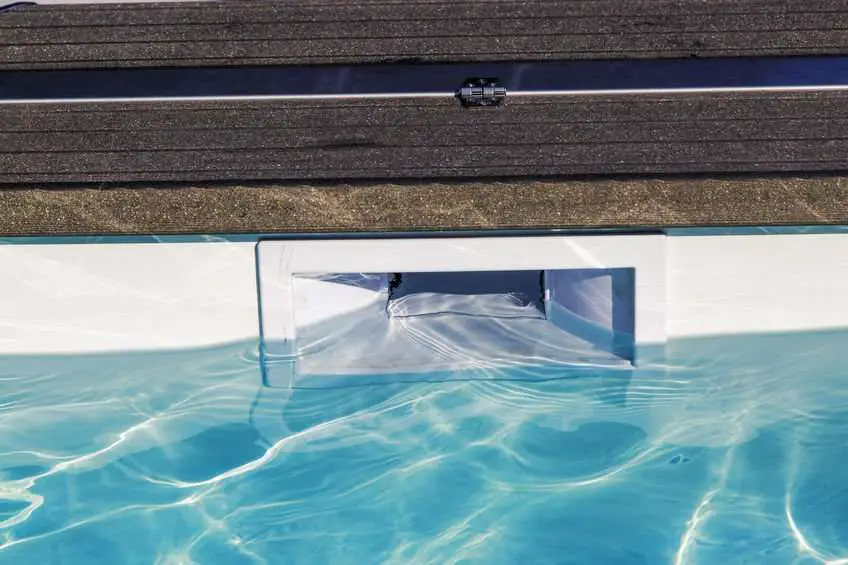What Should I Know About Salt Water Pools
You add salt to your pool water, and the salt chlorine generator converts it to chlorine . You should use salt that’s 99% pure or higher. Salt chlorine generators typically cost $1,700$2,500 upfront and last about 37 years. They’re easy to maintain, keep the water clear, and annually cost less than traditional chlorine.
Differences Between Traditional Chlorine Pools And Salt Water Pools
As you may already have imagined with what we just stated, salt water pools arent chlorine-free. This type of pool system produces chlorine from the salt added to the pool instead of adding chlorine to the pool like you would normally with chlorine pools.
Additionally, since salt water systems require chlorine generators, they run on electricity.
Although these systems have a higher initial investment compared to your traditional chlorine pools, its totally worth the price.
The reason behind this is because with salt water pools, you wont need to worry about constantly purchasing chlorine tablets. Not only that, but they are also easier to provide pool maintenance. Lastly, you wont be having that strong chlorine smell that many people dislike.
Super Chlorinate Your Above Ground Pool
A beneficial feature that some saltwater generator systems have is a super chlorinate setting. Super chlorinating your above ground pool is useful when there has been a high bather load or there has been an excessive amount of rain. Super chlorinating boosts the total amount of chlorine generated to clean up any high amounts of contaminates that cause the pool to appear cloudy or even green in color.
Recommended Reading: Concrete Pool Cracks
A Salt Water Pool Sanitation Happens Slightly Differently
The salt system or generator is purchased and gets installed on the pressure side back by the filtration system of the pool. This salt generator basically consists of a control box and a salt cell. The salt cell has metal plates in it which are connected to the control box. The control box sends an electrical charge to the plates which creates chlorine through a process called electrolysis. As pool water passes through the salt cell, the salt in the water is turned into Hypochlorous acid. Hypochlorous acid is the same component that is produced when any chlorine is added to pool water, whether you use sticks, tablets, granular or liquid. As the water returns to the pool, it will introduce the newly produced chlorine.
A salt water pool is also a chlorine pool because even though you are putting no chlorine into the pool the end result will be chlorine that is produced from the salt generator.
You Dont Need To Store Chlorine

No more storing chlorine. Lets face it, storing and handling chemicals is a nuisance. Especially if you have young children or pets in the home, it can be dangerous to store chlorine. In general, saltwater pools do not use chlorine in its man-made form, as the generator will convert salt into chlorine. The exception to this is if your pools balance gets substantially off track. Most of the time though, storing and handling chlorine are not things you will need to worry about.
Read Also: Pools At Lowes
Are Saltwater Pools Safe
Absolutely. They are no more or less safe than traditional chlorine pools. For all intents and purposes, saltwater pools work in much the same way as chlorine pools. The only difference is the delivery mechanism of the chlorine.
One caveat is that you may get a bit complacent with a saltwater pool. Because they need less frequent monitoring, some pool owners forget to check chlorine levels entirely. This is not a good idea and can lead to high levels of chlorine. Not high enough to harm you, but enough to dry out your skin.
Build The Pool Of Your Dreams
The convenience of having your own beautiful glimmering oasis of refreshing pool water just a fewsteps from your back door is truly a splendid thing. A pool can be everything froma source of evening relaxation, to a morning fitness spot, to a social status symbol.Your home swimming pool can be anything you want it to be.
Blue Science will work hand in hand with you to design a one-of-a-kind dream pool which perfectly complements your backyard environment. Give us a call today.
Read Also: Concrete Paint Around Pools
How Do Salt Swimming Pools Work
On-site chlorine generation in swimming pools has gained tremendous popularity over the years. Reports suggest saltwater chlorine generators account for over 35% of all residential pool automated sanitation systems. Swimmers and homeowners love their salt pools. They practically sell themselves through word of mouth. Smart pool pros should love them too salt systems and the consumables associated with them do wonders for business bottom lines.
This article breaks down how salt chlorine generators work in swimming pools. These popular backyard pool chlorine generator systems are commonly called salt systems, saltwater chlorinators, salt chlorinators, salt generators and more. Whether building new pools or retrofitting existing pools, consider some important factors involved with saltwater pool chlorine generating systems.
What Is A Chlorine Generator?
In short, chlorine generators create free chlorine in swimming pool water. By doing so, chemical storage, transportation, installation of chemical feeders, and handling chemical are reduced. A qualified pool professional should install chlorine generators.
Electrolysis is a method by which chemical reactions are carried out by passing an electrical current through a substance. In salt chlorine generation, electricity is passed through the salt solution mentioned above, breaking apart the salt molecules and ultimately producing free chlorine.
Is Salt Chlorine-Free? Is Salt Better Than Chlorine?
Powerclean Salt®
How Does A Saltwater Pool Work
A saltwater pool systems works differently from an older style chlorine or bromine system that requires the use of more chemicals. While these systems use a pump and filtration system, saltwater pools have an additional component the chlorinator cell and system that turns regular water softener salt into chlorine to sanitize your pool and keep the water crystal clear.
So how does a saltwater pool work exactly and what does this extra chlorinator component mean for pool maintenance?
Read Also: Cleaning Pool Tile Grout
Saltwater Pool Vs Chlorinated Pool
A saltwater pool gets cleaned using a filtering system called a salt chlorine generator. The system uses electricity to turn salt into chlorine, which cleans the pool.
In a chlorinated pool, chlorine tablets or granules are physically added on a regular basis for the same purpose.
In both pool types, its important to still check the pH levels and alkalinity of the pool so it stays sanitized and the chemicals stay balanced.
They Arent Heavy Water Chlorinated Thus No Chlorine Smells
Who doesnt enjoy swimming at a pool with smooth water?
Luckily, the saltwater treatment system makes the pool water feel silky smooth, which is a feature many people find desirable. Salt cells produce less harsh chlorine than the traditional method.
Also, the chlorine produced doesnt bring any harsh chlorine smells and it doesnt destroy swimming suits.
Moreover, saltwater pool systems offer continuous disinfection. Pool owners can have peace of mind since this system will kill germs and neutralize contaminants in the water.
With saltwater pools, you wont have to worry about cleaning and maintenance that much. The only thing youll need to do is to swim into happiness and enjoy unforgettable moments with your loved ones.
So, in general, we can say that a salt-chlorine generator produces a softer feel of the water. Besides, a saltwater generator will keep your swimming pool clean for a longer time.
You May Like: Tropicana Casino Pool
Remarkable Benefits Of Salt Water Pool Systems
When it comes to the benefits of saltwater pool systems, generally speaking, we can say that this chlorination method is gentler with your skin and eyes, and it can reduce the level of stress of users.
Saltwater pools are a better alternative compared to the average chlorine swimming pools. Keep reading, and youll realize we arent lying or just trying to promote the saltwater chlorination system.
Here are 4 benefits of salt water pool you should know of:
The Waterco Hydrochlor Saltwater Chlorinator

A salt-water chlorinated pool requires much less attention than a chlorine pool. A salt water pool provides a more comfortable swimming environment. Salt water feels better and is less irritating to the body than standard chlorinated water.
The Waterco Hydrochlor will automatically maintain the chlorine level of your pool and eliminate problems associated with periods of very high or low chlorine levels. Fewer fluctuations in chlorine levels mean fewer fluctuations in pH levels. This adds up to more stable, balanced water and consistently maintained sanitizer levels in the pool water will prevent the growth of all common algae.
We hope that you have found this article useful.
If youd like help in contacting a pool professional in your area in order to discuss installing a saltwater pool, then there is a contact button at the top right of this article that will get the process started.
If there is anything you would like to add to this article or if you would like to leave a comment then please just use the reply box below.
Don’t Miss: Aria Vegas Pools
How To Convert A Chlorine Pool To A Saltwater Pool
Perhaps you have a swimming pool, and it already uses a traditional chlorine sanitizing system to keep your pool water clean which is fine and all… but you’ve heard of all the benefits of saltwater pool systems and want to change over to the salty side.
Luckily, it turns out converting a chlorine pool to a saltwater pool is not only a fairly simple process, but relatively inexpensive as well! In this article, we’ll cover the basics of switching to saltwater and how you can easily do it yourself .
How To Make Your Salt Chlorine Generator Last Longer
A salt cell that undergoes regular maintenance can last anywhere from three to seven or more years. There are two things that greatly reduce the life expectancy of a salt cell: cleaning it too much or cleaning it improperly.
The chlorinator cell creates chlorine, a process that naturally leads to scaling on metallic grids. If this buildup continues without maintenance, itll decrease the performance of the salt cell. This buildup is cleaned by submerging it in a mild acid solution to dissolve the scales. If you conduct this process too often, it leads to erosion of the coating on titanium grids. The same problem is likely to occur if you use a highly-concentrated acid solution.
The control board can break down for unrelated reasons, namely because its an electrical component with an electrical internal circuit board.
So, how can you ensure your salt water system works for as long as possible?
- Have a professional maintain pool equipment on a regular basis.
- Check your pool to ensure consistent salt levels remain around 2700 to 3900 ppm.
- Have the chlorinator cell cleaned one time each season.
- If theres a lightning storm, turn off pool equipment.
- Maintain low calcium levels that meet manufacturer guidelines.
Recommended Reading: Lowes Pool Repair Kit
How Does A Saltwater Pool System Work
How Do Salt Systems Work? Saltwater systems have been becoming increasingly popular in recent years. They offer a number of benefits over a regular chlorine pool.
Saltwater swimming pools draw on dissolved salt in the water to generate chlorine. The salt cell or generator utilizes a process called electrolysis to break down or separate the salt also known as sodium chloride or NaCl in the water.
The chemical reaction created by electrolysis produces chlorine in the form of sodium hypochlorite and hypochlorous acid. These sanitizing / disinfecting / oxidizing agents are the same as chlorine commonly used in swimming pools in solid and powdered form. This means a saltwater pool is not actually chlorine free. It simply utilizes a chlorine generator instead of being dependent on chlorine added in other forms.
An important difference between a non-saltwater pool and a saltwater system is that saltwater pools have reduced amounts of chloramines. Chloramines are a by-product of oxidation or the breakdown of matter in the pool water and are the primary cause of eye irritation and a pungent chlorine smell. The reduced chloramines in a saltwater pool are one of the biggest advantages. The process of electrolysis oxidizes or eliminates chloramines in a much a similar manner as traditional chlorine shock.
Are There Salt Chlorinator Cons
Not all swimming pool structures are ideally suited for salt chlorination. Lets compare.
Concrete Pools
Unfortunately, salt chlorinators are not ideal for concrete swimming pools. Salt chlorinators can be up to five times more abrasive than traditional chlorine on concrete surfaces. Although salt chlorinators can still be used with concrete swimming pools, theyll require more frequent resurfacing which is a very costly repair.
Vinyl Liner Pools
The metal walls can rust. Vinyl liner pool owners often use salt chlorination, but because of the rust factor its not ideally suited to this type of pool structure.
Composite Fiberglass Pools
The boating industry led the way with fiberglass the most robust material for saltwater. The swimming pool industry followed suit but with significant refinements. The non-porous nature of composite fiberglass makes it ideal for swimming pools especially those with salt chlorine generation. Their polished surfaces make them soft to the touch, impenetrable to salt, and algae has a tough time adhering to surfaces.
The Ideal Combination
Salt chlorination has become the leader in pool and spa sanitization for five good reasons.
1. Salt is a low-cost solution for keeping swimming pool water sanitized.
2. Salt reduces the time spent maintaining a pools water.
3. Salt delivers silky-soft water.
4. Salt wont turn swimmers eyes red.
5. Salt wont bleach swimsuits and towels.
Don’t Miss: Aria Cabana
How Does A Salt Water Pool Work
In recent years, salt water pool systems have risen in popularity compared to traditional chlorine pools. There are many reasons for this shift. For one, salt water systems are often less harsh on your eyes and skin. Many owners note that the water feels softer and smoother in a salt water pool compared to a pool with chlorine. One of the biggest benefits of these swimming pools is the reduced cost of pool supplies since they do not require you to purchase chlorine. However, even as these pools become more popular, there are still many misconceptions about how they function.
Here are the basics of how these pool systems work:
Myth : Saltwater Pool Water Smells Strong And Tastes Like Salt
When you imagine owning a saltwater pool, you might assume that its like having a little piece of the ocean in your backyard. Its notand thats a good thing. A saltwater pool wont dry out your hair, make you smell like salt, and cover you in sand. As a swimmer, this pool type couldnt be more convenient.
And no, it doesnt taste like salt, eitherbut you shouldnt be drinking it anyway! And by the way, that includes your pets, too. This is not a water source for Fido, for his sake and yoursthe last thing you want to deal with is a dogs stomachache. Ill leave it at that.
If youre interested in saving the cost of operation significantly over time, the first thing to do is get a variable-speed pump. The 1.5 HP Blue Torrent Thunder Variable Speed In-Ground Pump is the way to go: it comes with a lifetime warranty, is available for rebates, and pays itself off in under a year. As customer Brian Turner says, delighted with the purchase first class service.
You May Like: How To Unclog Pool Pipes
How Does A Salt Cell Work And Other Faq Regarding Salt Systems
A salt cell, or salt generator, is used for a salt water pool and is responsible for generating chlorine. Salt water pools still rely on chlorine to sanitize water, but chlorine is added differently than it is with a traditional chlorinated pool. Salt cells work by transforming sodium chloride into chlorine. Salt cells work through a process known as electrolysis. Since salt water has an electrical charge, it splits the salt molecules and produces chlorine.
What Is A Saltwater Pool System And How Does It Work

Salt water pool systems have gotten a quite rep recently. In fact, its common for hotels and resorts to have one due to its perks.
But, what is a salt water pool? Is it as salty as the ocean?
Just as its name suggests, saltwater pools consist of a system that requires salt in order to keep it clean.
Salt water pools use a chlorine generator, which is commonly known as salt cell or salt chlorinator. Through a process called electrolysis, the salt cells break down the salt into the water, thus creating sodium hypochlorite. This fancy-name solution is the one that sanitizes your pools water.
Moreover, salt water pools dont taste salty like the ocean. These pool systems only have 3,000 parts per million of salt. The ocean, on the other hand, counts on over 35,000 ppm. For this reason, its much more comfortable swimming on salt water pools rather than on the ocean.
Read Also: How To Remove Iron From Pool
Myth : Switching To Saltwater Will Wreck My Pool
This one is a partial mythunless you take some precautions, converting your pool to saltwater might introduce rust. My recommendation is to get a sacrificial anode, which is a zinc cell that takes on the damage that would otherwise hit the parts around it. Youll want a professional electrician for thisas you probably know by now, electricity and water arent recommended for a novices first try. Yowch.
Its also best to avoid all steel, aluminum, or metal inside and nearby your pool, and invest in a vinyl pool liner if you have an above-ground pool.
